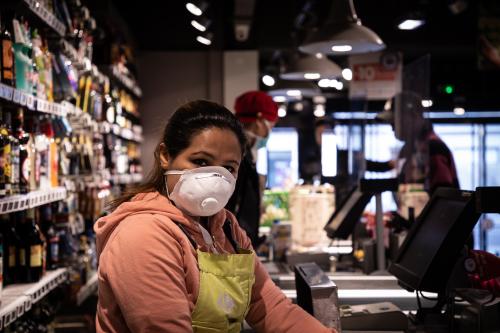E-commerce—defined broadly as the sale of goods and services online—is emerging as a key pillar in the global fight against COVID-19. Online grocery shopping and telemedicine, for instance, are helping to avoid in-person contact and reduce the risk of new infections. Video chats, movie streaming, and online education make physical distancing measures more bearable. In China, e-commerce companies played a key role in keeping the residents of Wuhan supplied during their two-month lockdown earlier this year.
At the same, e-commerce can help preserve jobs during the crisis. For many restaurants that have had to close during the economic freeze, online delivery services have become a lifeline. Teachers and consultants are continuing to work through video conferencing. In some cases, e-commerce is even creating new economic opportunities. In the United States, Amazon announced that it will hire 175.000 new workers.
Online search patterns already give a real-time indication of the role that the digital economy is playing in this pandemic. Worldwide searches for “online shopping,” “food delivery,” and “online doctor” have jumped with the global spread of the virus (Figure 1).
Governments can play a key role in helping businesses and households harness the power of e-commerce during this crisis. In most countries, the number of active COVID-19 cases is still growing every day. In some places, containment measures have slowed the spread of infections and some of the more extreme lockdown measures are gradually lifted. However, for all countries, preventing new infections and limiting in-person interaction are likely to remain key policy priorities for some time to come. Facilitating the digital economy should be a major pillar of government strategies.
1. Governments can make it easier for businesses and households to connect to the digital economy. Legal frameworks surrounding online remote service delivery can be clarified and, where appropriate, relaxed. For instance, India published new telemedicine guidelines last month. The United States adjusted its Medicare program to pay for telehealth services on the same basis as for in-person visits. Through websites along the lines of pauseregulations.com, governments can enlist the public to help identify regulatory bottlenecks.
Equally, governments can help overcome information frictions during the crisis. Local brick-and-mortar shops are rapidly moving online to continue serving their clients. Many internet service providers are offering expanded service packages to help households that practice physical distancing and use the internet more intensively than usual. Some online content providers have un-gated access to their archives to show solidarity. To help its citizens connect with these opportunities, Italy established a website listing free online services offered by companies during the crisis.
2. Governments can help ensure that e-commerce remains safe amid the epidemic. A COVID-19 code of conduct for e-commerce companies and delivery services can help ensure health and safety standards that all businesses need to maintain to avoid becoming virus spreaders. For instance, in-person interaction during deliveries and infection risk can be reduced by waving the need for recipient signatures for the duration of the epidemic.
Governments need to help educate customers about how to stay safe when shopping online. Online scams are surging during the crisis, including the sale of fake remedies and tests, price gouging on protective gear, as well as phishing messages to access secure information. Consumer protection agencies need to redouble their efforts to enforce safety and quality standards in the e-commerce space.
Some businesses moving to online orders will resort to cash-on-delivery, either because they cannot accept online payments or because many of their customers cannot pay electronically. The latest World Bank Findex survey found that 31 percent of adults worldwide still do not have access to a financial account. Especially given the need for physical distancing, cash-on-delivery may be a second-best option—full contactless online payment can obviate the need for in-person exchange of cash. Governments can support the use of contactless payments by raising awareness about its public health benefits and by working with financial institutions to ensure that everyone can access these means of payment.
3. Governments need to ensure that e-commerce can continue to operate. The e-commerce and delivery service workforce could be designated as front-line workers, receiving priority access to rationed COVID-19 testing and protective gear. Where travel restrictions are in place, a simple and workable mechanism needs to be developed to allow delivery services to continue functioning. The government should work closely with e-commerce and delivery companies to ensure that the workforce has access to adequate health care if needed.
The national postal service is often the main (and cheapest) means of delivery to clients, especially for local businesses that are just establishing an online presence. As such, maintaining this vital public infrastructure service throughout the crisis—while adjusting procedures to safeguard public health—is crucial. The postal service of China recently published an e-book sharing its lessons on how to maintain operations during the COVID-19 pandemic.
Ultimately, e-commerce lives on the dynamism and initiative of the private sector. Public policy can only play an enabling role, tackling market failures and creating an environment in which digital entrepreneurship can thrive. Already, the crisis has changed the e-commerce landscape, with businesses and customers more willing than ever to interact online and experiment with new services. Governments need to play their part and make sure that the e-commerce sector can reach its full potential in this public health and economic crisis.









Commentary
Leveraging e-commerce in the fight against COVID-19
April 27, 2020